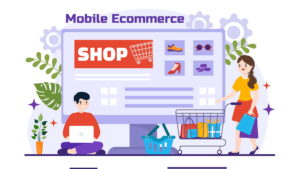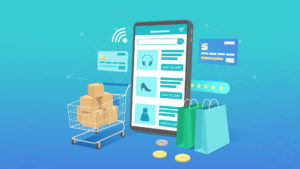E-commerce and M-commerce are the two main participants in the world of online purchasing. When most people think of online shopping with computers, they think of e-commerce, which has been around for a while. However, there is now another way to shop: mobile commerce, or m-commerce, which allows you to make purchases using your phone.
Simply put, M-commerce vs. E-commerce is a choice that is more feasible for people. But before, let us understand the concepts.
- E-commerce is the term for the purchase and sale of products and services through the Internet using computers or other electronic devices.
Features of this commerce platform are online stores, online marketplaces, or websites used to conduct transactions. Web browsers are usually used by customers to access e-commerce websites.
Examples include online retailers such as Shopify, eBay, and Amazon.
- However, M-commerce is the use of wireless mobile devices, including smartphones and tablets, for the purchase and sale of goods and services.
Features of this commerce platform are Mobile payment platforms, mobile apps, or websites designed for mobile devices used to perform transactions. It enables consumers to buy whenever and wherever they choose while on the go.
Examples include mobile payment programs like Apple Pay, Google Pay, and AliExpress, besides mobile shopping apps like Amazon Mobile, eBay Mobile, and AliExpress.

Now if we look at E-commerce vs. M-commerce, what distinguishes M-commerce from E-commerce? What impact do they have on online shopping habits? Which is better for companies, then?
Well, a lot of question arises for E-commerce and M-commerce. Let us see thoroughly,
We see, that there is a Convenience of M-commerce as it provides unmatched ease by enabling transactions to be completed using mobile devices, such as smartphones and tablets, at any time and from any location. Users can shop on the go because of this flexibility, which improves their overall purchasing experience.
E-commerce, on the other hand, offers a lot of choices that enable users to purchase using desktops or laptops from the comfort of their homes. It provides customers with access to a wide variety of websites, commerce platforms,s and online marketplaces where they can find almost any goods they want.
If we see Global Access to Goods and Services, E-commerce and M-commerce have both transformed online buying by increasing global access to goods and services. They have eliminated geographical restrictions, enabling customers to browse and buy products from any location in the globe.

M-commerce in particular has made purchasing more spur-of-the-moment and easy by providing a level of convenience that has changed consumer behavior. Users can explore, compare, and buy things instantaneously on their smartphones with a few clicks, which increases impulse buying and speeds up decision-making.
So for M-commerce vs. E-commerce, which is better for Businesses?
For Reach Optimization, adopting both M-commerce and E-commerce strategies can be quite beneficial for a business. By offering a strong online presence through web browsers, e-commerce enables businesses to appeal to consumers who prefer traditional desktop shopping.
In Catering Mobile Users, businesses can take advantage of the progressively expanding mobile user base by including M-commerce into their approach. Businesses can offer seamless, mobile-specific purchasing experiences by optimizing their websites and creating user-friendly mobile apps. This will increase their consumer base and boost sales.
E-commerce and M-commerce: Selecting the Best Platform for Your Company

For E-commerce and M-commerce, selecting the Best Platform for Your Company depends upon the tastes and actions of your target audience, user experience (UX), your items’ features and the best way to present them to customers, the technical needs and capabilities of your organization, and the marketing and advertising options that every platform has to offer.
First of all understand this, in the current digital era, having an online presence is essential for companies hoping to prosper in the cutthroat commercial environment. Since E-commerce and M-commerce provide different ways to contact clients, picking the appropriate platform is a crucial choice that can have a big impact on your company’s performance.
Whether you are an experienced business owner seeking to increase your digital footprint or a young entrepreneur trying to scheme into the territory of online shopping, knowing the distinctions between M-commerce and E-commerce is crucial for helping you make decisions that support your objectives.
Moreover, the emergence of E-commerce and M-commerce has completely changed how people shop by providing easy-to-use channels for making purchases of goods and services. Nonetheless, choosing the best commerce platform for your company needs serious thought and strategic planning because each one offers different chances and difficulties.
With the tried-and-true support of online shopping, e-commerce has long been the preferred medium for companies wishing to expand beyond physical storefronts. E-commerce allows users to easily browse, choose, and purchase products through websites or online marketplaces.
Typically, customers use desktop or laptop computers for these transactions. This platform is a flexible solution for a variety of organizations, from small startups to well-established corporations, since it gives versatility in terms of product display, marketing methods, and customization choices.

However, in E-commerce vs. M-commerce, mobile commerce, or M-commerce, is the next wave of online buying that takes use of how commonplace smartphones and tablets are as means of enabling purchases while on the go.
The M-commerce platform allows customers to shop whenever and wherever they choose. Using their mobile devices, they can browse lists, compare prices, and make purchases with a few simple screen clicks. This platform caters to the increasing number of mobile-savvy consumers who prefer to shop on their smartphones or tablets by providing unmatched accessibility and ease.
In M-commerce vs. E-commerce, numerous aspects need to be carefully considered when deciding between e-commerce and mobile commerce, such as your target market, business goals, financial constraints, and technological capabilities. M-commerce platform gives the benefit of mobility and immediacy, meeting the expectations of customers who value convenience and flawless mobile purchasing experiences, whilst e-commerce offers a strong and feature-rich platform for building an extensive online storefront.
Nonetheless, the digital landscape is always changing, and being flexible is essential to keeping up with emerging trends and technological advancements. Be willing to try out a variety of platforms and tactics to see what suits your company the best.
Investing in continuous optimization and monitoring is also necessary to maximize the efficiency of the commerce platform you have selected. To find areas for improvement and seize new chances, regularly review performance indicators, get input from customers, and keep up with industry advancements.
In E-commerce vs. M-commerce, the ultimate objective is the same whether you choose M-commerce, E-commerce, or a combination of the two, giving your customers smooth and fulfilling buying experiences that increase engagement, loyalty, and revenue.
E-commerce and M-commerce both have great aspects as commerce platforms. Choose what suit you well.













